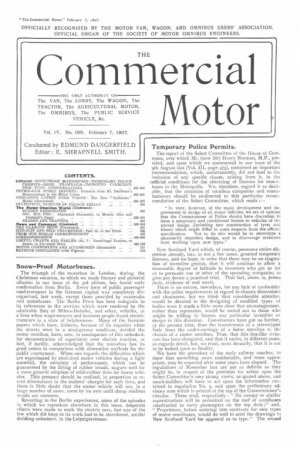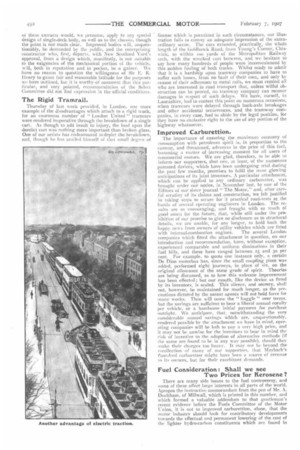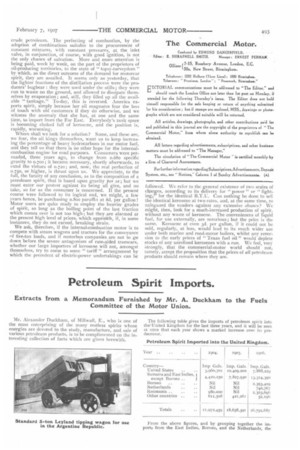Snow-Proof Motorbuses.
Page 1

Page 2

Page 3

If you've noticed an error in this article please click here to report it so we can fix it.
The triumph of the motorbus in London, during the Christmas vacation, to which we made literary and pictorial allusion in our issue of the 3rd ultimo, has found early confirmation from Berlin. Every form of public passenger road-transport in the German capital was completely disorganised, last week, except those provided by inotorcabs and motorbuses. The Berlin Press has been eulogistic in its references to the services which were rendered by the admirable fleet of Milnes-Daimler, and other, vehicles, at a time when wage-earners and business people found electric tramcars in a state of helplessness. Many of the German papers which have, hitherto, because of its vagaries when the streets were in a semi-grease condition, derided the motor omnibus, have, now, in consequence of this unlookedfor demonstration of superiority over electric traction, at last, if tardily, acknowledged that the motorbus has its good points in comparison with alternative methods for the public conveyance. When one regards the difficulties which are experienced by steel-tired motor vehicles during a light snowfall, the certainty of performance, which can be guaranteed by the fitting of rubber treads, augurs well for a more general adoption of solid-rubber tires for heavy vehicles. This prospect should be realised, in proportion to recent diminutions in the makers' charges for such tires, and there is little doubt that the motor vehicle will not, in a large number of cases, come by its own until cheap resilient treads are common.
Reverting to the Berlin experiences, some of the episodes in which we reproduce elsewhere in this issue, desperate efforts were made to work the electric cars, but one of the few which did keep to its work had to be abandoned, amidst deriding onlookers, in the Leipzigerstrasse.
Temporary Police Permits.
The report of the Select Committee of the House of Commons, over which Mr. (now Sir) Henry Norman, M.P., presided, and upon which we commented in our issue of the 9th August last (Vol. III, page 473), contained an important recommendation, which, unfortunately, did not lead to the inclusion of any specific clause, arising from it, in the 'official conditions for the obtaining of licenses for motorbuses in the Metropolis. We, therefore, regard it as desirable, that the attention of omnibus companies and manufacturers should be re-directed to this particular recommendation of the Select Committee, which reads :— ' In view, however, of the rapid development and improvement in design of all motor vehicles, we are of opinion that the Commissioner of Police should have discretion to issue a temporary and conditional license to vehicles of improved design (including new construction of tyres and wheel) which might differ in some respects from the official
specification. Not to do this would be to stereotype a necessarily imperfect design, and to discourage inventors from working upon new types."
New Scotland Yard which, of course, possesses entire discretion already, has, in not a few cases, granted temporary licenses, and we hope, in order that there may be no stagnation of inventive genius, that it will continue to allow a reasonable degree of latitude to inventors who get so far as to persuade one or other of the operating companies to give any device a practical trial. That fact, alone, is, prima facie, evidence of real merit. There is no excuse, nowadays, for any lack of conformity with the police requirements in regard to chassis dimensions and clearances, but we think that considerable attention would be devoted to the designing of modified types of h(xlies were it made a little more clear that encouragement, rather than repression. would be meted out to those who might be willing to finance any particular invention or design in this direction, Constructors have got no further, at the present time, than the transference of a stereotyped body from the under-carriage of a horse omnibus to the chassis of a motor omnibus. True, that this box-like structure has been elongated, and that it varies, in different cases, as regards detail, but, we trust, most devoutly, that it is not to be looked upon as finality.
We have the precedent of the early railway coaches, to show that something inure comfortable, and more appropriate, may be expected after some years have elapsed. The regulations of November last are not as definite as they might be, in respect of the provision for action upon the Select Committee's very strong views, as quoted above, and coach-builders will have to act upon the information contained in regulation No. 5, and upon the preliminary advisory note which is printed at the top of the Commissioner's circular. These read, respectively : "No canopy or similar superstructure will be permitted on the roof of omnibuses constructed to carry passengers on the top deck ;" and, " Proprietors, before entering into contracts for new types of motor omnibuses, would do well to send the drawings to New Scotland Yard for approval as to type." The second oi these extracts would, we presume, apply to any special design of single-deck body, as well as to the chassis, though the point is not made clear, Improved bodies will, unquestionably, be demanded by the public, and the enterprising constructor who, first, departs, with New Scotland Yard's approval, from a design which, manifestly, is not suitable to the exigencies of the mechanical portion of the vehicle, will, both in reputation and in pocket, be a gainer. We have no reason to question the willingness of Sir E. R. Henry to grant fair and reasonable latitude for the purposes we have outlined, but it is worthy of comment that this particular, and very pointed, recommendation of the Select Committee did not find expression in the official conditions.
The Rigid Tramrail.
Thursday of last week provided, in London, one more example of the disadvantages which attach to a rigid track, for an enormous number of "London United" tramcars were rendered inoperative through the breakdown of a single cart. As though to add insult to injury, the load upon the derelict cart was nothing more important than broken glass. One of our artists has endeavoured todepict the breakdown, and, though he has availed himself of that small degree of license which is permitted in such circumstances, our illustration fails to convey an adequate impression of the extraordinary scene. The cars extended, practically, the whole length of the Goldhawk Road, from Young's Corner, Chiswick, to within too yards of the Metropolitan Railway arch, with the wrecked cart between, and we hesitate to say how many hundreds of people were inconvenienced by this sudden fouling of both tracks. Whilst ready to admit that it is a hardship upon tramway companies to have to suffer such losses, from no fault of their own, and only by . reason of their adherence to metal rails, we must remind all who are interested in road transport that, unless wilful obstruction can be proved, no tramway company can recover damages in respect of such delays. We have, ourself, in Lancashire, had to contest this point on numerous occasions, when tramcars were delayed through back-axle breakages and other accidental occurrences, and the tramway companies, in every case, had to abide by the legal position, for they have no exclusive right to the use of any portion of the highway whatsoever.
Improved Carburettion.
The importance of ensuring the maximum economy of consumption with petroleum spirit is, in proportion to the current, and threatened, advances in the price of this fuel, becoming a matter of increasing moment for all users of commercial motors. We are glad, therefore, ro be able to inform our supporters, that one, at least, of the numerous patented devices, which have been undergoing trial during the past few months, promises to fulfil the most glowing anticipations of its joint inventors. A particular attachment, which can be applied to any ordinary carburetter, was brought under our notice, in November last, by one of the Editors of our sister journal " The Motor," and, after careful scrutiny of its claims and construction, we felt justified in taking steps to secure for it practical road-tests at the hands of several operating engineers in London. The results are so encouraging, and fraught with so much of good omen for the future, that, while still under the prohibition of our promise to give no disclosure as to structural details, we are unable, for any longer, to hold back the happy news from owners of utility vehicles which are fitted with internal-combustion engines. The several London companies which fitted the attachment in question, on our introduction and recommendation, have, without exception, experienced comparable and uniform diminutions in their fuel bills, and these have ranged between ,25 and 30 per cent. For example, to quote one instance only, a certain De Dion motorbus has, since the small coupling piece was added, performed eight journeys, in place of six, on the original allowance of the same grade of spirit. Theories are being discussed, as to how this welcome improvement has been effected; hut our mouth, like the device as fitted by its inventors, is sealed. This silence, and secrecy, shall not, however, be maintained for much longer, as the precautions dictated by the patent agents will not hold force for many weeks. Then will come the " haggle" over terms. but the savings are sufficient to bear a liberal annual royalty per vehicle, or a handsome initial payment for purchase outright. We anticipate, that, notwithstanding the very considerable annual savings which are, unquestionably, rendered possible by the attachment we have in mind, operating companiee will be loth to pay a very high price, and it may not be unwise for the inventors to bear hi mind the risk of incentive to the adoption of alternative methods (if the same are found to be in any way possible), should they make their charges too heavy. It may not be beyond the recollection of many of our supporters, that Maybach's float-feed carburetter might have been a source of revenue ro its owners, but for their exorbitant demands.
Fuel Consideration: Shall we see Two Prices for Kerosene?
There are many side issues to the fuel controversy, and some of these affect large interests in all parts of the world. Apropos the instructive memorandum from the pen of Mr. A. Duckham, of Millwall, which is printed in this number, and which formed a valuable addendum to that gentleman's recent evidence before the Fuels Committee of the Motor Union, it is not to improved carburettion, alone, that the motor industry should look for contributory developments towards the effectual and permanent lowering of the cost of the lighter hydro-carbon constituents which are found in crude petroleum. The perfecting of combustion, by the adoption of combinations suitable to the procurement of constant mixtures, with constant pressures, at the inlet valve, in conjunction, of course, with good ignition, is not the only chance of salvation. More and more attention is being paid, week by week, on the part of the proprietors of oil-producing territories, to the state of " topsy-turveydom " by which, as the direct outcome of the demand for motorcar spirit, they are assailed. It seems only as yesterday, that the lighter fractions of the distillation process were the producers' bugbear : they were used under the stills ; they were run to waste on the ground, and allowed to dissipate themselves by evaporation ; and, still, they filled up all the available " tankage." To-day, this is reversed. America exports spirit, simply because her oil magnates fear the loss of touch with old customers if they do otherwise, and we witness the anomaly that she has, at one and the same time, to import from the Far East. Everybody's tank space is becoming choked full of kerosene, and the position is, rapidly, worsening.
Where shall we look for a solution? Some, and these are, we fear, the oil kings themselves, want us to keep increasing the percentage of heavy hydrocarbons in our motor fuel, and they tell LI S that there is no other hope for the internalcombustion engine for road purposes. Consumers were persuaded, three years ago, to change from o.68o specific gravity to 0.700; it became necessary, shortly afterwards, to extol the virtues of 0.720; and, now, the real perfection of 0.750, or higher, is thrust upon us. We appreciate, to the full, the fatuity of any conclusion, as to the composition of a petroleum spirit, that is based upon gravity per se ; but we must enter our protest against its being all give, and no take, so far as the consumer is concerned. If the present course were followed to its logical end, we might, a few years hence, be purchasing o.800 paraffin at 8d. per gallon ! Motor users are quite ready to employ the heavier grades of spirit, so long as the boiling point of the last fraction which comes over is not too high; but they are alarmed at the present high level of prices, which approach, if, in some instances, they do not exceed, breaking strain. We ask, therefore, if the internal-combustion motor is to compete with steam wagons and tractors for the conveyance .flf five-ton loads, and if motorbus companies are not to go down before the severe antagonism of rate-aided tramcars, whether our large importers of kerosene will not, amongst theinselves, try to come to some "tariff " arrangement by which the precedent of electric-power undertakings can be followed. We refer to the general existence of two scales of charges, according to its delivery for " power " or "lighting;" for the identical B.T.U. Can nothing be done to sell the identical kerosene at two rates, and, at the same time, to safeguard the vendors against any extensive abuses? We might, then, look for a much-increased production of spirit, without any waste of kerosene. The conveniences of liquid fuel, for use externally, are notorious; but the price is the same. Kerosene at even 3d. per gallon, if it could not be sold, regularly, at less, would lead to its much wider use under both marine and road-motor boilers, whilst any rever sion to the early prices of "Texas fuel oil" would deplete stocks of any unrefined kerosenes with a run. We feel, very 'strongly, that the commercial-motor world should not, tamely, accept the proposition that the prices of all petroleum products should remain where they are.






















